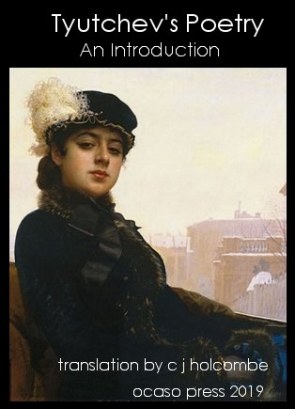A collection of English verse translations that observe Tyutchev's rhyme schemes: a pdf ebook that includes a detailed introduction, the Russian prosody, a literal translation, critical notes and a list of recordings available over the Internet.
Fedor Ivanovich Tyutchev (1803-73) was born into the ancient nobility, educated at the University of Moscow, and at eighteen entered the diplomatic service, in which he would serve, mainly abroad, for the next twenty-two years. He married a Bavarian member of the aristocracy (Eleonore Peterson, née Countess von Bothmer, a widow with four young sons) and came to regard Munich as his true home, making friends there with Heine and Schelling, and sending some forty poems to Pushkin's Sovreménnik over the 1836-38 period, where they were published over the signature of 'F.T.' but attracted little attention.

Tyutchev's work, occasional and never abundant, was rediscovered by Nekrásov, and remains celebrated for its lyrical nature pieces and intense love poetry. He is now regarded as the true descendent of Pushkin: the little poems sent to Sovreménnik are known by heart across Russia and the love poems speak of a torment that no one will wish to experience.
All the poetry, except the savage
invective of the late political pieces, which can rise into true
eloquence, is pantheistic, profoundly pessimistic and dualistic, indeed
Manichaen.
The Cosmos around us is always at the mercy of Chaos. Our
existence here is fleeting and precarious. Tyutchev poems are the
more remarkable in that he used Russian infrequently: his wives did not
speak Russian, and Tyutchev's everyday speech and correspondence was in
French.
This free ebook has a formal translation of 40 poems, with facing
Russian text.
A free Tyutchev Poems e-book in pdf format.
1. Весенняя гроза
Люблю грозу в начале мая,
Когда весенний, первый гром,
как бы резвяся и играя,
Грохочет в небе голубом.
Гремят раскаты молодые,
Вот дождик брызнул, пыль летит,
Повисли перлы дождевые,
И солнце нити золотит.
С горы бежит поток проворный,
В лесу не молкнет птичий гам,
И гам лесной и шум нагорный ―
Все вторит весело громам.
Ты скажешь: ветреная Геба,
Кормя Зевесова орла,
Громокипящий кубок с неба,
Смеясь, на землю пролила.
1. Spring Storm
I love a storm in early May,
when first of thunder crackles through
the frolic of a happy day
reverberating into blue.
New peals of thunder. Spread among
the dust thrown up in plashy spreads
are liquid pearls of raindrops strung
upon the sunlight’s golden threads.
Then floods on mountain slopes appear,
and bird songs come from woods around:
the hill and forest calls are here
now gathered in one gladdened sound.
You’ll say that Hebe, giving sup
to Zeus’ eagle here has downed
the thunder from her heavenly cup
and, laughing, spilled it on the ground.
1828, modified in the 1850s.
34. Silentium
Молчи, скрывайся и таи
И чувства и мечты свои ―
Пускай в душевной глубине
Встают и заходят оне
Безмолвно, как звезды в ночи,-
Любуйся ими ― и молчи.
Как сердцу высказать себя?
Другому как понять тебя?
Поймёт ли он, чем ты живёшь?
Мысль изречённая есть ложь.
Взрывая, возмутишь ключи,-
Питайся ими ― и молчи.
Лишь жить в себе самом умей ―
Есть целый мир в душе твоей
Таинственно-волшебных дум;
Их оглушит наружный шум,
Дневные разгонят лучи,-
Внимай их пенью ― и молчи!..
34. Silentium
Be silent, hide yourself, conceal
the things you dream of, things you feel:
As the stars in motion, let
these marvels from ascension set.
Let depths of soul then stay unheard.
In awe reflect without a word!
The flowering heart is not divined
so can some other know your mind?
Or say what you are living by
when thoughts once spoken are a lie?
The water’s clouded when it’s stirred,
so drink the spring without a word:
So live within your self’s control:
a world is centered in your soul,
and one of strange enchanted thoughts
that noisy flare outside distorts.
By day’s hard glare be undeterred,
take in those songs without a word
Second half of the 1820s. The title is Latin for Silence.